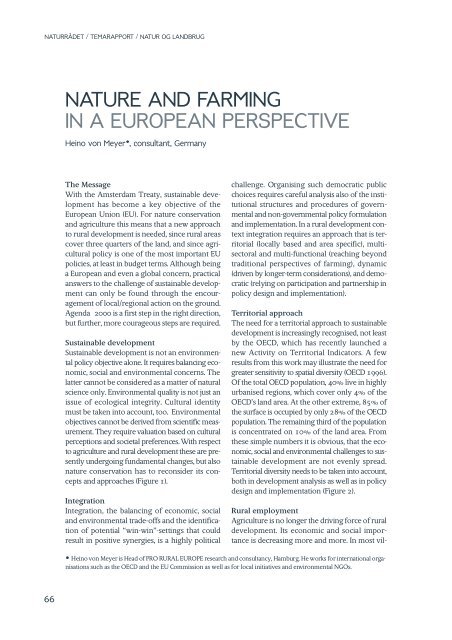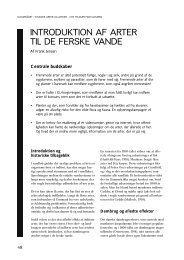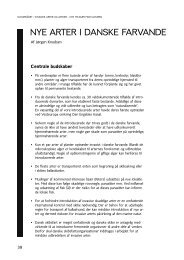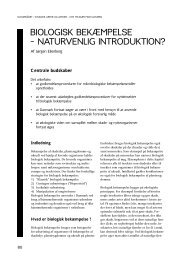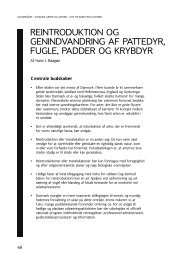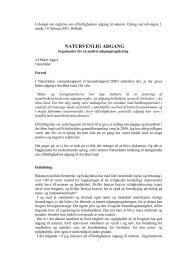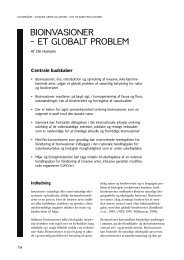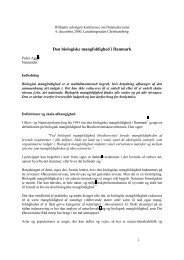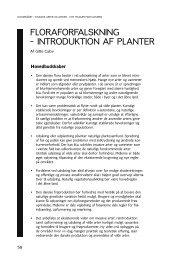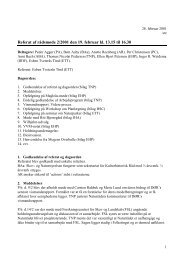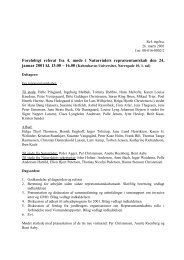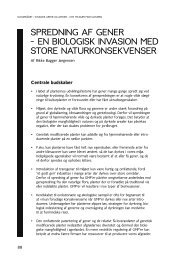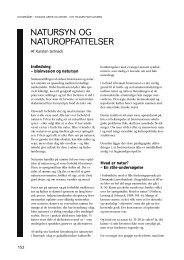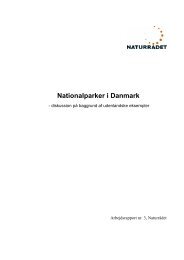Læs hele rapporten som pdf-fil. - Naturrådet
Læs hele rapporten som pdf-fil. - Naturrådet
Læs hele rapporten som pdf-fil. - Naturrådet
Create successful ePaper yourself
Turn your PDF publications into a flip-book with our unique Google optimized e-Paper software.
NATURRÅDET / TEMARAPPORT / NATUR OG LANDBRUG<br />
66<br />
NATURE AND FARMING<br />
IN A EUROPEAN PERSPECTIVE<br />
Heino von Meyer , consultant, Germany<br />
The Message<br />
With the Amsterdam Treaty, sustainable development<br />
has become a key objective of the<br />
European Union (EU). For nature conservation<br />
and agriculture this means that a new approach<br />
to rural development is needed, since rural areas<br />
cover three quarters of the land, and since agricultural<br />
policy is one of the most important EU<br />
policies, at least in budget terms. Although being<br />
a European and even a global concern, practical<br />
answers to the challenge of sustainable development<br />
can only be found through the encouragement<br />
of local/regional action on the ground.<br />
Age n d a 2000 is a first step in the right direction,<br />
but further, more courageous steps are required.<br />
Sustainable development<br />
Sustainable development is not an environmental<br />
policy objective alone. It requires balancing economic,<br />
social and environmental concerns. The<br />
latter cannot be considered as a matter of natural<br />
science only. Environmental quality is not just an<br />
issue of ecological integrity. Cultural identity<br />
must be taken into account, too. Environmental<br />
o b j e c t ives cannot be derived from scientific measurement.<br />
They require valuation based on cultural<br />
perceptions and societal preferences. With respect<br />
to agriculture and rural development these are presently<br />
undergoing fundamental changes, but also<br />
nature conservation has to reconsider its concepts<br />
and approaches (Figure 1).<br />
Integration<br />
Integration, the balancing of economic, social<br />
and environmental trade-offs and the identification<br />
of potential “win-win”-settings that could<br />
result in positive synergies, is a highly political<br />
c h a l l e n ge. Organising such democratic public<br />
choices requires careful analysis also of the institutional<br />
structures and procedures of governmental<br />
and non-governmental policy fo r m u l a t i o n<br />
and implementation. In a rural development context<br />
integration requires an approach that is territorial<br />
(locally based and area specific), multisectoral<br />
and multi-functional (reaching beyond<br />
traditional perspectives of farming), dynamic<br />
( d r iven by longer-term considerations), and democratic<br />
(relying on participation and partnership in<br />
policy design and implementation).<br />
Territorial approach<br />
The need for a territorial approach to sustainable<br />
development is increasingly recognised, not least<br />
by the OECD, which has recently launched a<br />
new Ac t iv i ty on Territorial Indicators. A fe w<br />
results from this work may illustrate the need fo r<br />
greater sensitiv i ty to spatial div e r s i ty (OECD 1996).<br />
Of the total OECD population, 40% live in highly<br />
urbanised regions, which cover only 4% of the<br />
OECD’s land area. At the other extreme, 85% of<br />
the surface is occupied by only 28% of the OECD<br />
population. The remaining third of the population<br />
is concentrated on 10% of the land area. From<br />
these simple numbers it is obvious, that the economic,<br />
social and environmental challenges to sustainable<br />
development are not evenly spread.<br />
Territorial div e r s i ty needs to be taken into account,<br />
both in development analysis as well as in policy<br />
design and implementation (Figure 2).<br />
Rural employment<br />
Agriculture is no longer the driving force of rural<br />
development. Its economic and social importance<br />
is decreasing more and more. In most vil-<br />
• Heino von Meyer is Head of PRO RU RAL EUROPE research and consultancy, Hamburg. He works for international organisations<br />
such as the OECD and the EU Commission as well as for local initiatives and environmental NGOs.


